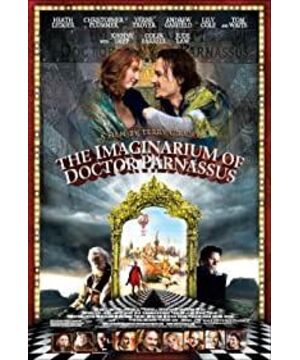Unlike Terry Gilliam’s previous crazy spoofs, the story core of "Magic Fantasy Show" is always reminiscent of "Faust." The right to immortality; but many centuries later, Pasley fell in love. In order to get the love of his lover, he exchanged the soul of the child with the devil in exchange for eternal youth; then, Parnassos came to the devil to seduce The competition of the souls of others, in order to preserve the soul of the child, so that it will not be taken away by the devil.
Parnassos is such a Faust who is always played by the devil. Of course, in "Magic Fantasy Show", the devil played by the rock veteran Tom Weitz is much more interesting than the one in "Faust." Dr. Naxos’ sincerity of faith has inspired the devil to play games with him. This is inevitably reminiscent of the famous allusion in the Bible. God and Satan bet and test Job against God by torturing Job. The devotion of faith. In a sense, the bet between the devil and Dr. Parnassos is a bit like a bridge segment in "The Book of Job", except that Dr. Parnassos is not a Christian (it has a shadow of Tibetan Buddhism), so God No need to play.
Dr. Parnassos’ beliefs are very peculiar. They believe in "story". According to Parnassos, once the story stops telling, the universe will end—this is very postmodern, according to the analysis of postmodern narratologists. Human beings recognize and construct the entire world through narrative. From primitive people telling stories around a bonfire, to contemporary narrative symbol systems, human beings can be said to be narrating all the time. We narrate and we are also narrated by narratives. It can be said that our universe is described by us.
Therefore, Dr. Parnassos can be called the metaphysical master of postmodern narratology, and he broke through the deep connection between narrative and human existence. As a result, the immortal Dr. Parnassos traveled through countless centuries, telling his eternal story-but his audience became less and less. In fact, Parnassos made a mistake of subject setting, why should he speak for himself? If someone can tell their own story, isn't it done once and for all? According to legend, after the ancient Indian fairy Anthill wrote the immortal epic "Ramayan", he vowed to the gods that he would die with "Ramayan". But you know, "The Ramayana" will almost continue to be recited until the end of the (human) universe, so the anthill stole the eternal glory from the gods in this way—compared to the anthill, Dr. Parnassos's Taoism is much lower.
After gaining immortality, Dr. Parnassos, the more he worked, the more emaciated, and for him, immortal life had become a kind of torture. This is a bit like Sybil, the prophet in ancient Greek mythology. When she obtained the right to eternal life from Apollo, her life became more and more unbearable due to the passing of youth, and she finally only wanted to die. Of course, this bet in "Magic and Fantasy Show" is an improved version. Parnassos gained immortality, youth and children successively. When Parnassos saw his daughter build a happy family, the old man left contentedly. ——Although the daughter will never recognize him again.
As for Heath Ledger, the liar who entered the Parnassos Circus by fraud, was finally hanged in a whimsical world by the doctor. And the whimsical world that Parnassos established is a desire amplifier like Inception, where everyone's subconscious desires will be revealed.
Finally, Dr. Parnassos began to perform on the roadside again, telling the eternal "Magic Fantasy Show" story.
The devil blinked, and it won again-the story is not over, only the devil is immortal.
(Published in "Southern People Weekly" No. 43 on December 12, 2011)
View more about The Imaginarium of Doctor Parnassus reviews











